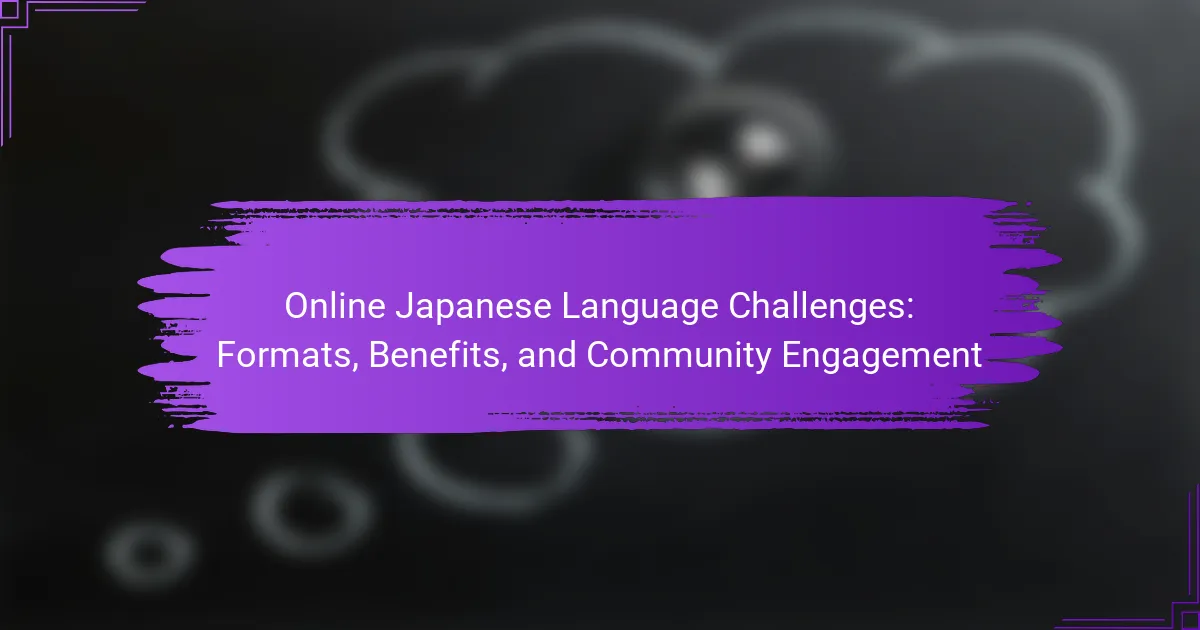What are Online Japanese Language Challenges? Online Japanese Language Challenges are structured activities designed to enhance language learning through competition or collaboration. These challenges often involve tasks such as vocabulary quizzes, conversation practice, and grammar exercises. Participants can engage in these activities through online platforms, fostering a sense of community. The format can vary, including […]

Designing Effective Quizzes for Online Japanese Courses: Types, Best Practices, and Engagement
What are Effective Quizzes in Online Japanese Courses? Effective quizzes in online Japanese courses are assessments designed to enhance language learning. They should include various question types like multiple-choice, fill-in-the-blank, and short answer. These formats cater to different learning styles and help reinforce vocabulary and grammar. Quizzes should also provide immediate feedback to learners. This […]

Speaking Practice Strategies for Japanese Learners + Conversation Partners + Online Platforms
What are Effective Speaking Practice Strategies for Japanese Learners? Effective speaking practice strategies for Japanese learners include engaging in conversation with native speakers and utilizing online platforms. Conversation partners provide real-time feedback and cultural insights. Language exchange apps, such as Tandem or HelloTalk, connect learners with native speakers. Regular practice sessions help reinforce vocabulary and […]

Japanese Folklore and Mythology: Key Stories, Characters, and Cultural Impact
What is Japanese Folklore and Mythology? Japanese folklore and mythology encompass the traditional stories, beliefs, and deities of Japan. These narratives often include gods, spirits, and legendary creatures. They reflect the cultural values and historical experiences of the Japanese people. Common themes include creation myths, morality, and the relationship between humans and nature. Prominent figures […]

The Benefits of Using Authentic Japanese Media in Online Classes: Cultural Exposure, Language Practice, and Student Engagement
What are the benefits of using authentic Japanese media in online classes? Using authentic Japanese media in online classes enhances cultural exposure, language practice, and student engagement. Cultural exposure is achieved through real-life contexts presented in media, which helps students understand Japanese customs and societal norms. Language practice improves as students encounter colloquial expressions and […]

Kanji Learning Tools: Techniques, Resources, and Progress Tracking
What are Kanji Learning Tools? Kanji learning tools are resources designed to assist learners in mastering the Japanese writing system. These tools include flashcards, apps, textbooks, and online courses. Flashcards help reinforce memory through spaced repetition. Apps often feature interactive exercises and quizzes for practice. Textbooks provide structured lessons and explanations. Online courses offer video […]

Japanese Language Apps: Features, User Experience, and Effectiveness
What are Japanese Language Apps? Japanese language apps are digital tools designed to help users learn the Japanese language. These applications often include features like vocabulary building, grammar lessons, and pronunciation practice. Many apps utilize interactive exercises, quizzes, and games to enhance user engagement. Some popular examples include Duolingo, Rosetta Stone, and Busuu. Each app […]

Assessment and Evaluation Methods in Online Japanese Education: Formative Assessments, Summative Assessments, and Feedback Mechanisms
What are Assessment and Evaluation Methods in Online Japanese Education? Assessment and evaluation methods in online Japanese education include formative assessments, summative assessments, and feedback mechanisms. Formative assessments are ongoing evaluations that provide insights into student progress. They can include quizzes, discussions, and interactive activities. Summative assessments occur at the end of a learning period […]

Interactive Tools for Online Japanese Education: Enhancing Student Participation and Learning Outcomes
What are Interactive Tools for Online Japanese Education? Interactive tools for online Japanese education include applications, platforms, and software designed to enhance language learning. These tools often feature interactive exercises, quizzes, and games that engage students actively. Examples include language exchange platforms like Tandem and apps such as Duolingo and Rosetta Stone. Many tools utilize […]

Writing Skills Development in Japanese + Practice Exercises + Feedback Mechanisms
What is Writing Skills Development in Japanese? Writing skills development in Japanese refers to the process of enhancing one’s ability to write effectively in the Japanese language. This development involves mastering various writing systems, including Hiragana, Katakana, and Kanji. It also includes understanding grammar, syntax, and style specific to Japanese writing. Effective writing in Japanese […]
